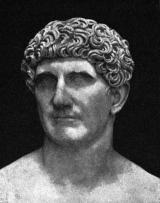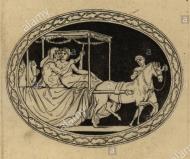Who dated Mark Antony?
Volumnia Cytheris dated Mark Antony from ? until ?.
Glaphyra dated Mark Antony from ? until ?.
Mark Antony

Marcus Antonius (14 January 83 BC – 1 August 30 BC), commonly known in English as Mark Antony, was a Roman politician and general who played a critical role in the transformation of the Roman Republic from a constitutional republic into the autocratic Roman Empire.
Antony was a relative and supporter of Julius Caesar, and he served as one of his generals during the conquest of Gaul and Caesar's civil war. Antony was appointed administrator of Italy while Caesar eliminated political opponents in Greece, North Africa, and Spain. After Caesar's assassination in 44 BC, Antony joined forces with Lepidus, another of Caesar's generals, and Octavian, Caesar's great-nephew and adopted son, forming a three-man dictatorship known to historians as the Second Triumvirate. The Triumvirs defeated Caesar's killers, the Liberatores, at the Battle of Philippi in 42 BC, and divided the government of the Republic among themselves. Antony was assigned Rome's eastern provinces, including the client kingdom of Egypt, then ruled by Cleopatra VII, and was given the command in Rome's war against Parthia.
Relations among the triumvirs were strained as the various members sought greater political power. Civil war between Antony and Octavian was averted in 40 BC, when Antony married Octavian's sister, Octavia. Despite this marriage, Antony carried on a love affair with Cleopatra, who bore him three children, further straining Antony's relations with Octavian. Lepidus was expelled from the association in 36 BC, and in 33 BC, disagreements between Antony and Octavian caused a split between the remaining Triumvirs. Their ongoing hostility erupted into civil war in 31 BC when Octavian induced the republic to declare war on Cleopatra and proclaim Antony a traitor. Later that year, Antony was defeated by Octavian's forces at the Battle of Actium. Antony and Cleopatra fled to Egypt where, having again been defeated at the Battle of Alexandria, they died by suicide.
With Antony dead, Octavian became the undisputed master of the Roman world. In 27 BC, Octavian was granted the honorific title of Augustus, marking the final stage in the transformation of the Republic into a monarchy, with himself as the first Roman emperor.
Read more...Volumnia Cytheris

Кифери́да, или Волу́мния (лат. Cytheris/Volumnia; умерла после 43 года до н. э.), — древнеримская актриса, танцовщица и куртизанка, современница Цицерона и Марка Антония.
Read more...Mark Antony

Glaphyra
Glaphyra (Greek: Γλαφύρα) was a hetaera, a form of courtesan, who lived in the 1st century BC. Glaphyra was famed and celebrated in antiquity for her beauty, charm and seductiveness. Her marriage to Archelaus the elder of Cappadocia gave her political power. Her later affair with Mark Antony occasioned a vulgar poem from Octavian Caesar.
Read more...